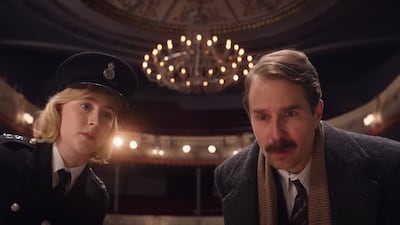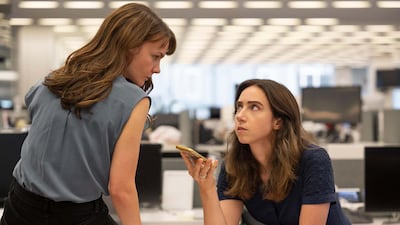When Black Panther landed in cinemas in 2018, it was cited as a moment of cultural significance to rival anything that Hollywood had offered before.
In the early years of Tinseltown, the vast majority of black roles came from a specific subset of often derogatory cliches: slaves, butlers and criminals, while being frequent tropes.
As things moved on, even where positive roles have existed, films such as The Help (2011) were created in what its Academy Award-nominated star Viola Davis later described to Vanity Fair as a filter of “systemic racism”.
With Black Panther, all that changed. Here was a director (Ryan Coogler) directing a black superhero (Chadwick Boseman) in a cast that was almost entirely made up of black actors — with notable exceptions for Andy Serkis’s villain and Martin Freeman’s traditional authority figure CIA agent.
It felt like the floodgates had opened — even if the industry is still yet to see anything on such a scale since, despite a growing drive towards greater inclusivity, with particular credit due to Disney, especially its Marvel arm, among the major studios.

Now Sony is ready to make a statement with The Woman King. Director Gina Prince-Bythewood took the baton from Black Panther and ran with it for this epic tale of the historical elite female soldiers known as the Agojie, protectors of the real West African kingdom of Dahomey. Black Panther’s creators have also admitted they were the real-life inspiration for the female warriors of their own film.
This time around, the director and leads went one step further and shot in South Africa — mostly Cape Town and KwaZulu-Natal — with a largely local crew and supporting cast, to tell a true story that has been forgotten by history. It feels like another cultural milestone.
For star John Boyega, who plays the film’s “man king” to Davis’s title character, it was one he was determined to play a part in. “The role wasn't a career move or for advancement in my career. I would have been in it even if it was a walk-on part,” he tells The National.
“I just wanted to witness what was happening, because I feel like the artists and actors, especially the South Africans and the African diaspora, there's something important about that.
“I wanted my name to be mentioned when they say that this is one of the projects that prompts conversations in the industry. I wanted to be there to witness that cultural moment, to share it with the audience, so they can be a part of the celebration of that change that I think is steadily coming.”

Davis agrees with Boyega about the film’s importance, although she notes that its cultural significance may be greater for audiences than for its cast and crew. “For you, it’s cultural significance. To us, it just seems right. This is our normal,” she says.
“This is what we always knew we could do. All the actors in this movie have always been great. They’ve trained for Lord knows how long.
"They've done theatre. They've gone to acting school. They've been in the line. This moment means we're stepping into what we already knew. You're having a moment, because you're seeing what we can do. For us the moment is just: ‘Hey, we're here,’ the exhilaration of just being seen. Finally."
Finally is an appropriate word. Prince-Bythewood adds that this labour of love was a long time in the making. “I think this film existing is a miracle, given the history of Hollywood,” she says.
“Wonder Woman absolutely changed the game, and then Black Panther opened the doors to move into this bigger sandbox and do bigger films like this, but the numbers are still dismal. Certainly for black female directors.
“Our hope is that success begets success. Panther’s success allowed this film to get green lit, although it still took Viola and her star power, and me coming in off the success of The Old Guard [a superhero film on Netflix].
“My hope is that this is a success so that another filmmaker coming up can tell a different story, because there are 1,000 different stories out there that need to be told, that can be viable and entertaining and fun and still say something to the world. For me, that's why I'm a filmmaker, to do both those things.”

Davis agrees that the film’s success is crucial. This is a big-budget, historical blockbuster complete with vast battle scenes, lush sets and the eyes of the world on its performance. For its star, failure is simply not an option. “The movie has to make money,” she says, matter-of-factly.
“I feel conflicted about that, but if it doesn't make money then what it means, overall, is that black women, dark-skinned black women, they can't bring a global box office. That's it, period. And now they’ll have data on it, because Woman King did A, B and C. They don’t do that with ‘white movies.’ If they fail, they just make another movie.”
Davis concedes that the pressure is on, but she’s also confident that there are plenty of reasons to check out The Woman King beyond doing our bit for diversity.
“It's not just that it's black, female-led, the cultural significance of it. It's that it’s a very entertaining movie,” she says.
“But if we are indeed all equal, then I'm challenging you to prove it. Not just for my career, trust me, that's not my style. But if you can plop down your money to see Avatar, if you can plop down your money to see Titanic, then you can plop your money into seeing The Woman King.
“Do it for the future, the world you want to see. Do it for moviemaking that you want to see." She adds she is "150 per cent" certain it will succeed, before adding: "But if it doesn't, then guess what? You won't see us at all. That's the truth. I wish it were different.”
Out now in the US, The Woman King will be in UAE cinemas from October 6
Scroll through images of more upcoming film releases below





















